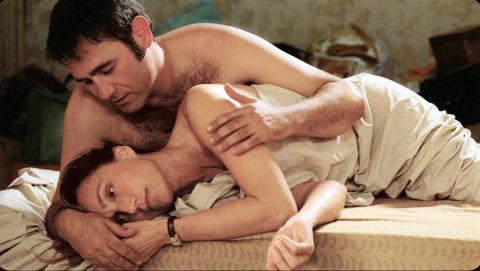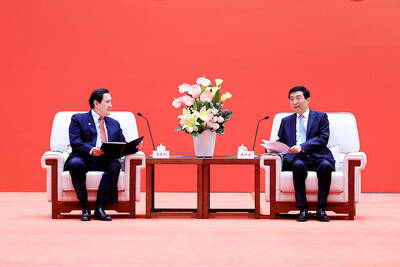Leaving sees Kristin Scott Thomas once again in a French-language production, following on from her powerful performance in I’ve Loved You So Long (Il y a longtemps que je t’aime, 2008), which was released here in October 2009. She doesn’t disappoint, and while her character, Suzanne — a woman fighting the suffocating boredom imposed by her upper middle class life — hasn’t the same edginess of Juliette Fontaine, the unrepentant murderer of her own child from I’ve Loved You So Long, it is for the most part a marvelously nuanced interpretation of a Lady Chatterley-like character.
Leaving tells the story of Suzanne, a physiotherapist married to a doctor in a stable if not terribly passionate relationship. They have two children, both going through a rather aggressive adolescence. Suzanne wants to get back to work, and her husband Samuel (Yvan Attal) has spent a considerable sum of money to set up a consulting room for her in their spacious home. The worker on the project is Ivan (Sergi Lopez, Capitan Vidal from Pan’s Labyrinth), a Spaniard working illegally in France who has a blue-collar directness and easy manner that contrasts vividly against Samuel’s formal manner. The charm of the set up is that while the husband is far from being anyone’s romantic fantasy, he is considerate and kind. He does, however, want value for money.
Thomas creates in Suzanne a kind, rather naive character who has the best of intentions and an almost total ignorance of the harsh world outside her privileged existence. In discovering passion, she steps outside the rules that have always protected her. That she has done wrong is never in doubt. Attal gives her able support as Samuel, for while we might not find his demand that his conjugal rights be respected wholly sympathetic, he does not forfeit our acknowledgement that he has a case to make. Suzanne has stepped outside the rules, but although she is the film’s romantic heroine, our indulgence for her actions is never a forgone conclusion.

Photo courtesy of iFilm
For most of the film, Leaving has much to admire as an interpretation of an age-old story of how passion can take hold of a life and destroy it.

The canonical shot of an East Asian city is a night skyline studded with towering apartment and office buildings, bright with neon and plastic signage, a landscape of energy and modernity. Another classic image is the same city seen from above, in which identical apartment towers march across the city, spilling out over nearby geography, like stylized soldiers colonizing new territory in a board game. Densely populated dynamic conurbations of money, technological innovation and convenience, it is hard to see the cities of East Asia as what they truly are: necropolises. Why is this? The East Asian development model, with

Desperate dads meet in car parks to exchange packets; exhausted parents slip it into their kids’ drinks; families wait months for prescriptions buy it “off label.” But is it worth the risk? “The first time I gave him a gummy, I thought, ‘Oh my God, have I killed him?’ He just passed out in front of the TV. That never happens.” Jen remembers giving her son, David, six, melatonin to help him sleep. She got them from a friend, a pediatrician who gave them to her own child. “It was sort of hilarious. She had half a tub of gummies,

The wide-screen spectacle of Formula One gets a gleaming, rip-roaring workout in Joseph Kosinski’s F1, a fine-tuned machine of a movie that, in its most riveting racing scenes, approaches a kind of high-speed splendor. Kosinski, who last endeavored to put moviegoers in the seat of a fighter jet in Top Gun: Maverick, has moved to the open cockpits of Formula One with much the same affection, if not outright need, for speed. A lot of the same team is back. Jerry Bruckheimer produces. Ehren Kruger, a co-writer on Maverick, takes sole credit here. Hans Zimmer, a co-composer previously, supplies the thumping

There is an old British curse, “may you live in interesting times,” passed off as ancient Chinese wisdom to make it sound more exotic and profound. We are living in interesting times. From US President Donald Trump’s decision on American tariffs, to how the recalls will play out, to uncertainty about how events are evolving in China, we can do nothing more than wait with bated breath. At the cusp of potentially momentous change, it is a good time to take stock of the current state of Taiwan’s political parties. As things stand, all three major parties are struggling. For our examination of the